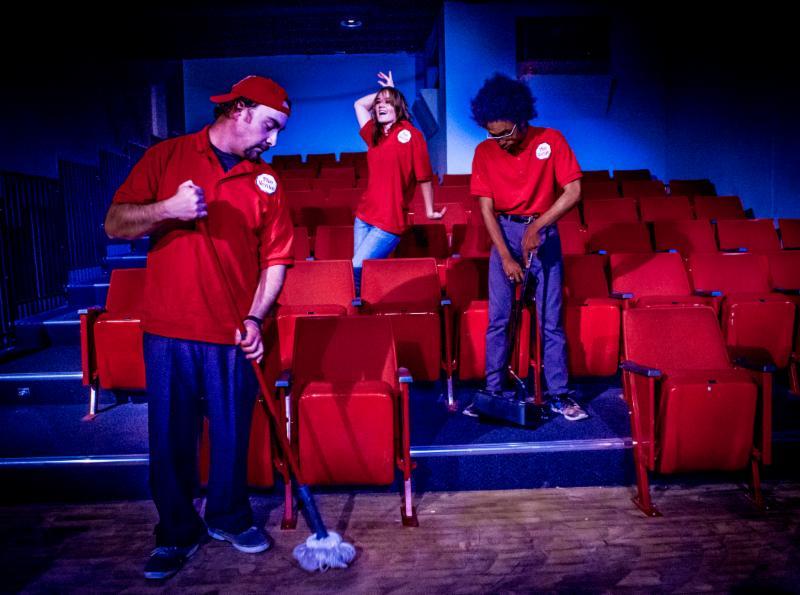Review: THE FLICK at Aux Dog Theatre
 I did not know, until reading the "about the author" note in the program for The Flick that its playwright, Annie Baker, has written an adaptation of Chekov's Uncle Vanya. I'm hardly surprised, because the play has a pretty Chekovian sensibility in a lot of ways, but, like well performed Checkov, The Flick drew the audience in and didn't let us go until the the entire tragicomic plot played out. This production of The Flick reinforces Aux Dog's status as one of the local greats in regards to producing well done and compelling contemporary theatre.
I did not know, until reading the "about the author" note in the program for The Flick that its playwright, Annie Baker, has written an adaptation of Chekov's Uncle Vanya. I'm hardly surprised, because the play has a pretty Chekovian sensibility in a lot of ways, but, like well performed Checkov, The Flick drew the audience in and didn't let us go until the the entire tragicomic plot played out. This production of The Flick reinforces Aux Dog's status as one of the local greats in regards to producing well done and compelling contemporary theatre.
It's true that The Flick is a nearly three hour long play (with a 95 minute first act and a 60 minute second, and an intermission), but it never actually feels long. The director, Justin Golding, kept the production well, but realistically paced, and wasn't afraid to either spice up some of the stage business (the characters spend a lot of time sweeping the theatre) with some comedy, or to, in turn, just let the production breathe.
The plot of The Flick is very much about the mundane (though not boring) existences of three employees at a run down one screen movie theatre. Sam (Brandon McDaniel) is the oldest and most senior employee (though only by five months). He's gruff but kind, direct, and aware of (though he rarely talks about) the kind of pathetic nature of his existence - he is a thirty something who still lives at home with his parents, after all, and works a basically entry level gig at an old movie theatre. Rose (Katherine Jackson) has been there almost as long, and is the manic pixie dream girl type projectionist (The titular Flick is one of the last theatres without a digital projection system at the start of the play). They are joined by newcomer Avery (Dachary Vann), an anxious young movie buff who is taking a semester off from college. Avery is black, and it is implied (and honestly, likely) that racism ties in to the somewhat tragic ending of the play.
(Something I've noticed about productions at Aux Dog is that through excellent play selection, as well as the fabulous acting and directing talent pool from which they draw, they are masters of dealing with issues of race in a sophisticated, but incredibly impactful, manner. They never preach or hit the audience over the head with their point, but the point is always powerfully made.)
An excellent Safwon Farmer joins the cast briefly in both acts, but the play is mostly about the relationships between the first three. It would, in a way, cheapen the play to discuss their relationships in regards to "who likes who", though there is some of that; much of the beauty of the play comes from the naturalistic dialogue that feels so authentic and honest between coworkers and, ultimately, friends. The characters go from playing games of six degrees of separation involving actors to discussing serious mental illness, but none of it ever feels unrealistic or unimportant.
The conversations demonstrating the budding friendship between Sam and Avery were especially effective; Mr. McDaniel and Mr. Vann were perfectly cast in their roles and have great chemistry. The moments where they silently interact, or even just silently respond to something that has happened on stage, are particularly beautifully done. Ms. Jackson does a lovely job as well, but she is stifled by some very difficult to play writing (even just reading the script several years ago, I remember wondering how on earth someone would approach the character of Rose - Ms. Jackson did it well, but I wished the script had done her more favors); even so, she committed fully, and had some very, very nice moments, particularly later in the play when Sam forced her to drop her facade (or, as they say in the play, "stereotype") and be real.
The space in which the actors played was what is ordinarily the house of the theatre; audience members were seated on the stage. I think this was probably the most effective choice possible, and Dan K. Tabeling's set design helped sell the fact that the space was indeed an old, one screen movie theatre. Cody Kelien's lighting design aided in the illusion (the location of the audience meant that we were located where the screen would have been, and light that seemed to be projecting a film in our direction helped sell that idea). Mr. Keilien also designed the sound, which also contributed a lot to the atmosphere of the play - scene changes all featured themes from iconic movies, which was great. Lastly, though simple, Rhonda Backinoff's costume design was effective and subtly conveyed a lot about the characters.
In truth, a play like The Flick in some ways seems to be best served with a subtle approach, though; it is one of the truest representations of real life that I have seen in theatre, and real life ultimately isn't about big, dramatic moments, but about the small interactions between people who really just need connection. Aux Dog's production of The Flick did a wonderful job of telling the story of a small group of employees for whom that was the case.
The Flick opened March 22nd and closes today. For tickets, go to www.auxdogtheatre.org or call 505-596-0607. Many performances have sold out; check for availability.
Add Your Comment
Videos
